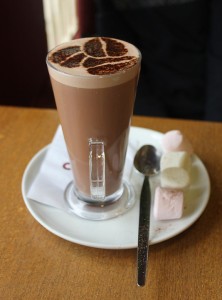Chocoholics have a new reason to enjoy their favorite treat free of guilt. New research suggests chocolate is good for keeping your brain healthy and functioning sharply, perhaps delaying or slowing diseases such as Alzheimer’s.
A Harvard researcher found that drinking two cups of hot chocolate a day helps older people keep their brains healthy and their thinking abilities strong.
“We’re learning more about blood flow in the brain and its effect on thinking skills,” said Farzaneh A. Sorond, of the Harvard Medical School and a Boston area neurologist. “As different areas of the brain need more energy to complete their tasks, they also need greater blood flow. This relationship, called neurovascular coupling, may play an important role in diseases such as Alzheimer’s.”
Sorond studied 60 people who were, on average, 73 years old, and didn’t have any form of dementia.
Over a 30-day period, Sorond had his volunteers drink two cups of hot cocoa a day while abstaining from consuming any other forms of chocolate during that time.
The study participants didn’t drink the same cocoa. Half consumed hot cocoa enhanced with an additional amount of the antioxidant flavanol, which is normally found in cocoa as well as tea and some fruits and vegetables. The other half received cocoa with a much smaller amount of the added antioxidant.
Sorond found that the amount of flavanol enhancement made no difference between the two groups of people, but drinking hot chocolate did seem to have an impact.
Throughout the 30-day period, the study participants took memory and thinking skills tests as well as ultrasound tests to measure the amount of blood flow to the brain.
Eighteen participants showed signs of having impaired blood flow to their brains at the start of the study. By the end of the 30-day test period, those 18 people showed an 8.3-percent improvement in the blood flow to the working areas of their brain. They also improved their performance on a working memory test, with scores dropping from 167 seconds at the beginning of the study to 116 seconds at the end.
However, study participants who started the tests with normal brain blood flow showed no improvement.
Twenty-four of the research participants – a mix of those with and without the restricted brain blood flow – were given MRI scans of their brains to see if there were any tiny areas of brain damage.
The MRI scans revealed that those with reduced blood flow were also more likely to have these small areas of brain damage.
“More work is needed to prove a link between cocoa, blood flow problems and cognitive decline,” said Paul B. Rosenberg of Johns Hopkins School of Medicine in Baltimore, who wrote an editorial that accompanied the study. “But this is an important first step that could guide future studies.”























It is good to know that chocolates are tested for brain functions but I also agree that these findings need more research. Yes, chocolates have an antioxidant effect but chocolates do have an addictive effect as well. Any addiction is bad for us and there are also proven studies suggest that chocolates may increase the risk for obesity. All in all, it is still a processed sweetened food and chocolate intake or consumption must be taken with limited amount.